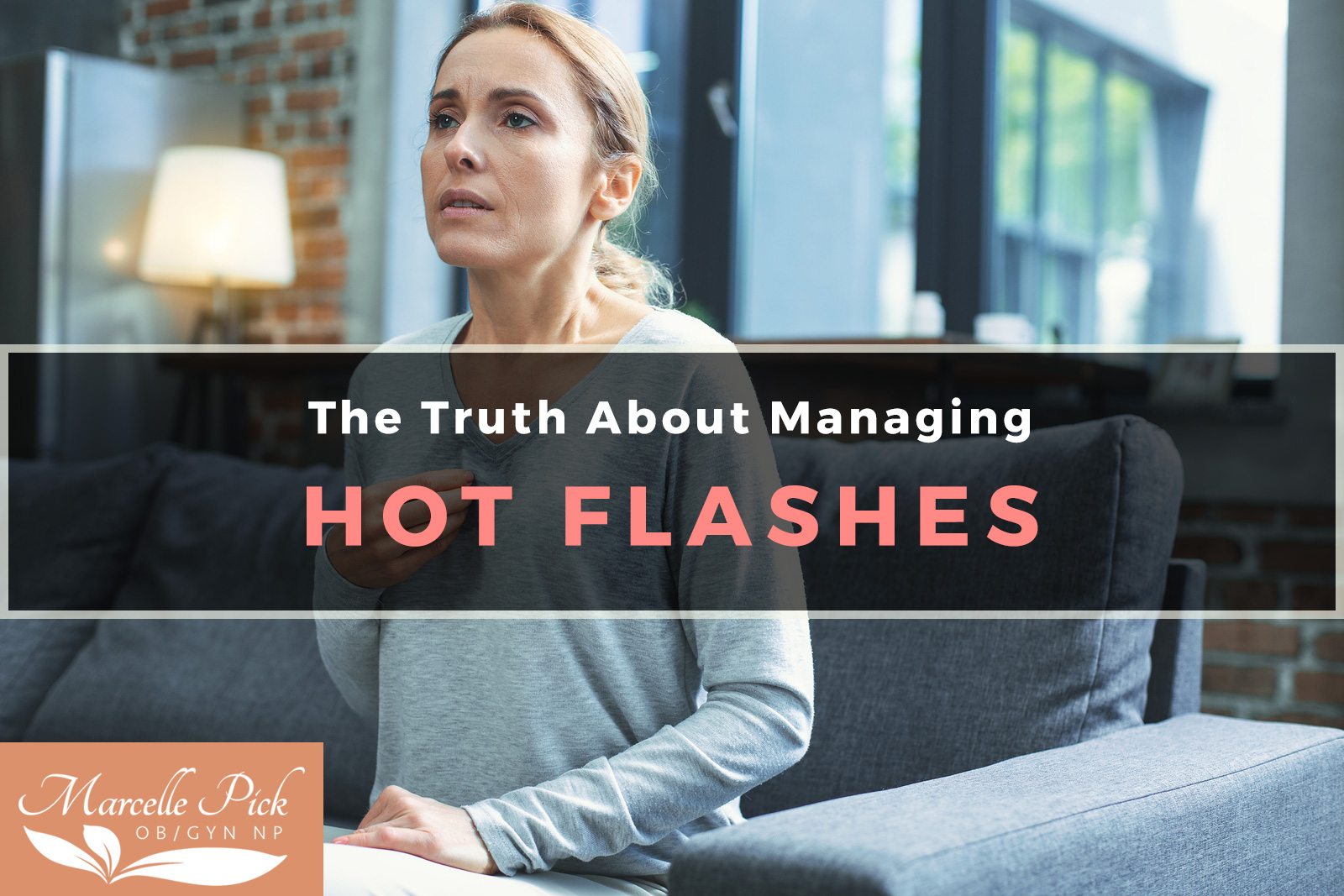Are you terrified of starting menopause? Concerned for potential sleepless nights, uncontrollable mood swings, and more? Are you afraid you have to accept these symptoms as normal? Rest assured, you’re not the only woman who has these fears and questions when it comes to menopause.
I hear from dozens of women like you each day who are searching to find answers they can rely on. They want solid information that helps them understand the symptoms of perimenopause and menopause. They want to become clearer on what’s really going on in their bodies. Of course, the ultimate goal is to feel better. It is my belief that women should stop thinking they have to simply accept this fate.
Many women are concerned because they have been told the only “answer” to their troubling symptoms is prescription medication. Let me assure you that’s simply not the case. As both a practitioner and a woman who has experienced it first-hand, I would like to give you some facts about what menopause really means for you. Also, I’ll provide you with information on the many relief options that are available to treat your symptoms. No, you don’t have to “live with it!”
Common Menopause Questions
Ending the confusion, worry or fear you may be experiencing starts with having information you can trust. And having concrete steps to take will help you feel better physically, too. So, let’s get started! To help me, I’ve asked Paula, a nurse at the Women to Women clinic, to share 3 common menopause questions she hears from women like you.
What Does the Term ‘In Menopause’ Mean?
Paula: You may think that you can’t be in menopause because you aren’t having the “classic” symptoms. It can be difficult to understand that symptoms can vary, and may include things less commonly attributed to menopause. But they’re all connected. Some women may say, “I’m not in menopause yet since I’m not having hot flashes or night sweats.” However, when I dig deeper, they’ll tell me they are, in fact, experiencing other symptoms like fatigue, irritability, poor concentration and weight gain – all of which can be related to menopause.
Marcelle: First, I want to stress that menopause is a normal, natural process. All women will, eventually, experience it. But the process doesn’t have to be the frightening mystery it once was. We have good information that can help you understand – and minimize the symptoms of – menopause.
The term ‘in menopause’ means your menstrual periods have stopped; by conventional standards, you’ve gone for a period of 12 months without menstruating. While the average age for women to enter menopause is 52, some start as early as their 30’s (which in our society is becoming, unfortunately, more common). Others start as late as their 60s.
In both menopause and perimenopause – the time of transition which leads to menopause – our hormones are in a state of tremendous change. The fluctuations in our hormones cause shifts in our other body systems as well. At times, our bodies have difficulty responding to these changes and can’t readjust properly. That’s what creates symptoms like hot flashes, irritability, loss of sex drive, weight gain and fatigue.
These symptoms can make life for a woman extremely difficult. After all, how can you be happy when your moods alienate you from those around you, you can’t get a handle on weight gain, and you feel like you’re burning up from the inside?
Why Does My Doctor Dismiss My Concerns, Telling Me ‘Everything is Alright,’ Or That I’m ‘Too Young for Menopause’ When I Know I Don’t Feel Like Myself?
Paula: Women know their own bodies better than anyone else – and they know when things just don’t feel right. But often, they dismiss menopause as a possibility due to their age. Well-meaning friends will tell them they are “too young” for menopause, or their healthcare provider shows them a lab result disproving hormonal imbalance. This may discourage these women and they may begin to feel as though their only alternative is to struggle through their symptoms alone. As we said above, the age women go through menopause varies widely and you know what’s “normal” for you. Unexplained symptoms should never be dismissed – despite your age or test results.
Marcelle: Relying only on age, or the level of one specific hormone, doesn’t give you a complete picture. Every woman is unique, and may have hormonal or adrenal imbalance that shows up differently. And so many other factors can also contribute to symptoms, including diet, lifestyle and genetics. So although your practitioner may be technically correct when they tell you your tests fall in the “normal” range, they aren’t correct when they say everything is fine. If you feel lousy, you’re clearly not fine.
Through my decades of practice, I have found that the truest indicator of your overall health is how you feel. If your own natural ability to produce and balance your hormones is impaired, or your adrenal glands are over-worked, you’re more likely to have symptoms. And these symptoms are your body’s cry for help.
What Are My Options for Feeling Better?
Paula: Women tell us they hear things like, “Try this sleeping pill. I’m prescribing an antidepressant. Try hormones or birth control!” Natural choices are never even mentioned. But many women don’t want to take a pill – that’s why they call us. It’s also common for us to hear from women who have gone the medication route, and are experiencing side effects that are sometimes worse than their original symptoms! The information around prescriptions is so confusing; it seems like some antidepressants are even being advertised to provide relief of menopausal symptoms! This is happening more often since the Women’s Health Initiative results.
Marcelle: Many healthcare providers assume that most women want an easy fix – that they would prefer taking a pill over learning about the benefits of natural alternatives, diet and exercise. But that’s not what I hear from women, and it’s certainly not the best course of action. I believe in giving women information and options so they can make decisions that are right for their unique situations. The Women’s Health Initiative clearly showed us that hormone replacement therapy is not the answer for everyone. And while sleep aids, antidepressants and birth control pills might relieve symptoms temporarily, they don’t address the fundamental problems of hormonal or adrenal imbalances.
When women are choosing the path to travel on their journey through menopause, I want them to realize there are many natural ways they can help their body balance itself. And they are simple and straightforward! Adjusting diet, exercise, and sleep patterns really are effective. An easy detox can help by flushing out toxins that might have been building up inside for years. A good multivitamin added to the right herbs and oils can work wonders. And addressing emotional history – your family patterns and relationships – is also beneficial.
Paula: This is an excellent chance for women to examine their lives and consider how much better they might feel with some lifestyle changes. Even women who think they eat right, already avoiding sugar or caffeine, may still not be getting the nutrients their bodies require. And all too often, we’re still highly influenced by what television and big box stores are communicating to us.
Marcelle: We began by talking about fear and confusion. I think a lot of women are relieved to find out this is all fairly normal. There’s nothing to be scared of! Once women understand what happens in menopause, they’ll be able to trust themselves to choose the best course of action for them as unique individuals. I founded MarcellePick.com for this reason. I wanted an easy way to share the knowledge and insight I’ve gained through working with so many women over the years. In sharing this information, I can consistently provide the most effective and reasonable solutions for women who are experiencing perimenopause or menopause, and give them the tools they need to take control of their own health.
Your questions are important and I’m here to help answer them. Helping women realize they don’t have to do the same old things they’ve always done is one of the most satisfying aspects of my work!
Confused About Your Symptoms?
Take our free Hormonal Imbalance Quiz to uncover what your specific symptoms are telling you.







